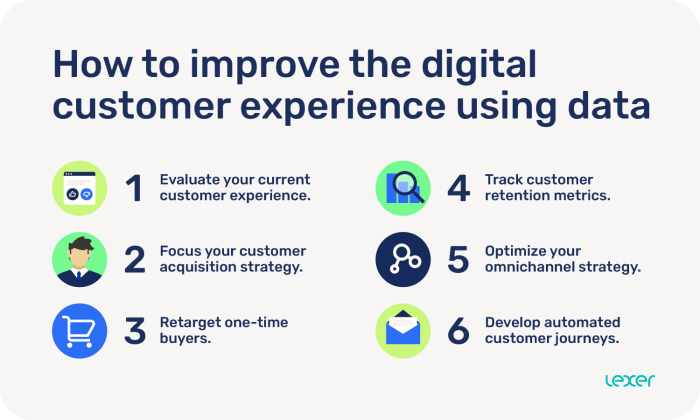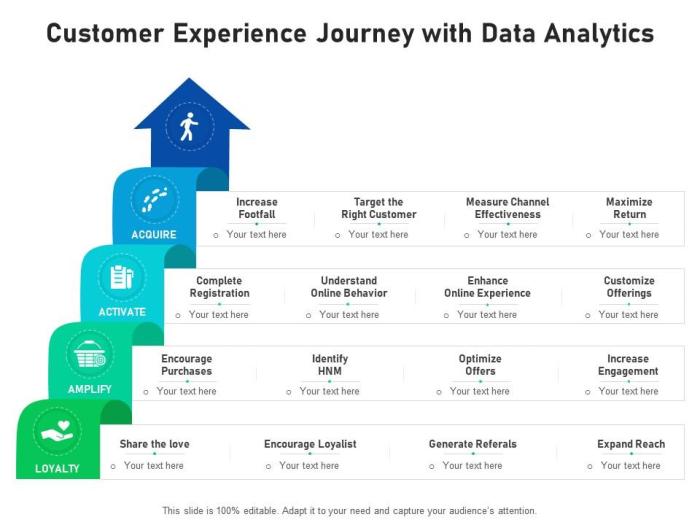Using Data to Improve Customer Experience sets the stage for businesses to thrive by understanding customer needs and preferences through data-driven strategies.
Exploring the significance of data in enhancing customer satisfaction and loyalty, this topic delves into the crucial role data plays in shaping personalized experiences.
Importance of Data in Customer Experience
Data plays a crucial role in understanding customer behavior as it provides valuable insights into preferences, buying patterns, and interactions with the brand. By analyzing data, businesses can tailor their strategies to meet the needs and expectations of their customers effectively.
Utilizing Data to Enhance Customer Satisfaction
Businesses utilize data in various ways to enhance customer satisfaction. For example, they track customer interactions on their website to identify pain points and improve the user experience. By analyzing feedback and reviews, companies can address issues promptly and make necessary improvements to products or services.
- Implementing targeted marketing campaigns based on customer preferences and past purchase history.
- Personalizing product recommendations and offers to create a more tailored shopping experience.
- Using data analytics to predict customer needs and proactively address them before they arise.
Impact of Personalized Experiences on Customer Loyalty, Using Data to Improve Customer Experience
Personalized experiences driven by data have a significant impact on customer loyalty. When customers feel understood and valued by a brand, they are more likely to remain loyal and continue doing business with them. By leveraging data to create personalized interactions, businesses can foster long-term relationships with their customers and increase retention rates.
- Providing customized recommendations based on past behavior and preferences increases customer engagement and satisfaction.
- Tailoring communication channels to individual preferences enhances the overall customer experience and strengthens brand loyalty.
- Offering exclusive promotions and rewards based on customer data can incentivize repeat purchases and build trust with the brand.
Collecting Relevant Data

In order to improve customer experience, it is crucial to collect relevant data that provides valuable insights into customer behavior and preferences. By identifying key data points and utilizing ethical and secure methods for data collection, companies can better understand their customers and tailor their services accordingly.
Key Data Points for Improving Customer Experience
- Customer demographics: Age, gender, location, income level, etc.
- Purchase history: Products or services bought, frequency of purchases, average order value.
- Customer feedback: Surveys, reviews, complaints, and suggestions.
- Website analytics: Browsing behavior, time spent on site, pages visited.
Methods for Ethical and Secure Data Collection
- Obtain consent: Clearly communicate to customers the purpose of data collection and obtain their consent.
- Anonymize data: Remove personally identifiable information to protect customer privacy.
- Secure storage: Use encryption and secure servers to safeguard collected data from unauthorized access.
- Regular audits: Conduct periodic audits to ensure compliance with data protection regulations.
Examples of Successful Data Collection Strategies
- Amazon: Utilizes customer purchase history and browsing behavior to recommend personalized products.
- Netflix: Analyzes viewing habits to suggest tailored movie and TV show recommendations.
- Sephora: Uses customer feedback and preferences to offer personalized beauty product recommendations.
- Starbucks: Leverages customer loyalty program data to provide customized offers and rewards.
Analyzing Customer Data
When it comes to analyzing customer data, the process involves extracting valuable insights from the information collected to enhance the overall customer experience. By examining patterns, trends, and behaviors, businesses can make informed decisions to better serve their customers.
Importance of Data Accuracy and Quality
Ensuring data accuracy and quality is crucial in the analysis process as it directly impacts the reliability of the insights derived. Inaccurate or incomplete data can lead to flawed conclusions and misguided strategies, ultimately hindering the improvement of customer experience.
Garbage in, garbage out – emphasizing the importance of starting with accurate and high-quality data for meaningful analysis results.
Examples of Data Analysis Impact
- Personalized Recommendations: By analyzing customer purchase history and browsing behavior, online retailers can offer personalized product recommendations, resulting in increased sales and customer satisfaction.
- Targeted Marketing Campaigns: Through data analysis of customer demographics and preferences, businesses can tailor their marketing campaigns to specific target audiences, leading to higher engagement and conversion rates.
- Improving Service Efficiency: Analyzing customer feedback and support interactions can help identify common issues and pain points, allowing companies to streamline processes and provide quicker resolutions, thus enhancing the overall customer experience.
Implementing Data-Driven Strategies: Using Data To Improve Customer Experience

Implementing data-driven strategies is crucial for businesses looking to enhance customer experience. By leveraging data insights, companies can tailor their products and services to meet the specific needs and preferences of their customers. This not only helps in improving customer satisfaction but also increases loyalty and retention rates.
Role of AI and Machine Learning
Artificial Intelligence (AI) and machine learning play a significant role in implementing data-driven strategies for customer experience. These technologies can analyze vast amounts of data quickly and accurately, identifying patterns and trends that human analysts might miss. AI can also personalize interactions with customers by predicting behavior and preferences based on historical data.
- AI-powered chatbots can provide real-time assistance to customers, improving response times and resolving issues more efficiently.
- Machine learning algorithms can recommend products or services based on individual customer preferences, leading to higher conversion rates.
- Predictive analytics can anticipate customer needs and proactively offer solutions, enhancing the overall customer experience.
Success Stories
Many companies have successfully transformed their customer experience through data-driven initiatives. One such example is Netflix, which uses AI algorithms to analyze user viewing habits and provide personalized recommendations. This has significantly increased customer engagement and retention on the platform.Another success story is Amazon, which utilizes machine learning to predict customer buying behavior and optimize product recommendations. This has led to a substantial increase in sales and customer satisfaction levels.By implementing data-driven strategies powered by AI and machine learning, businesses can gain a competitive edge in today’s market and deliver exceptional customer experiences.
